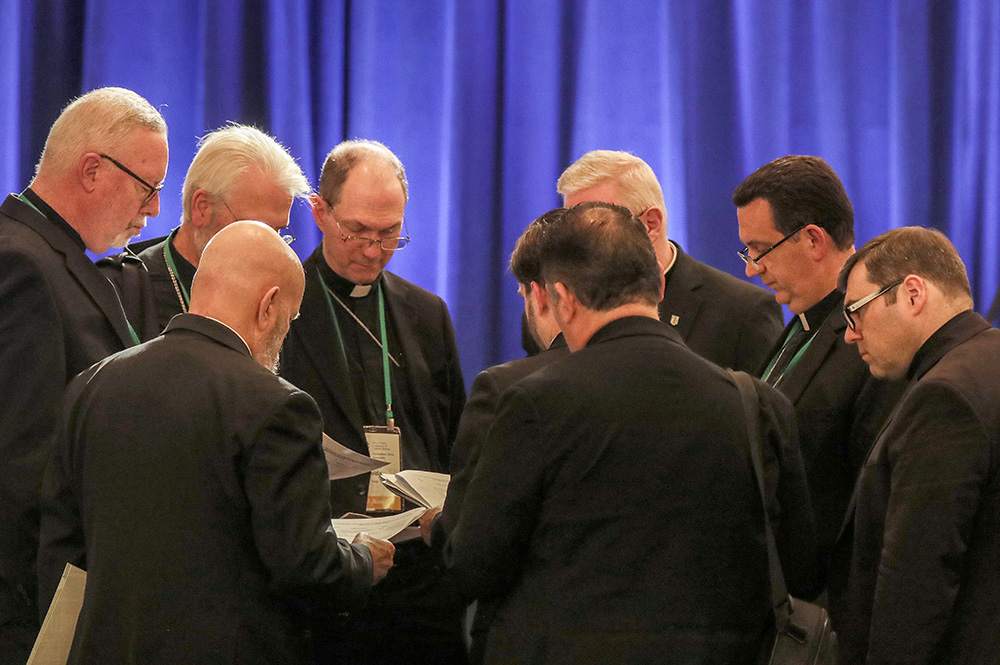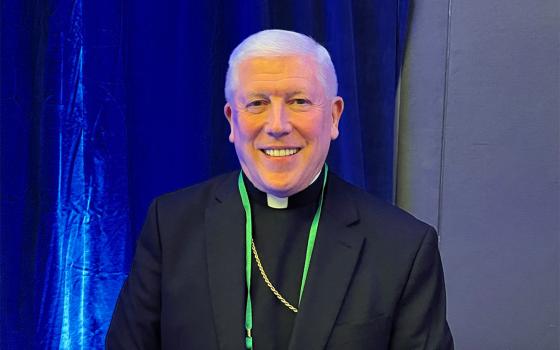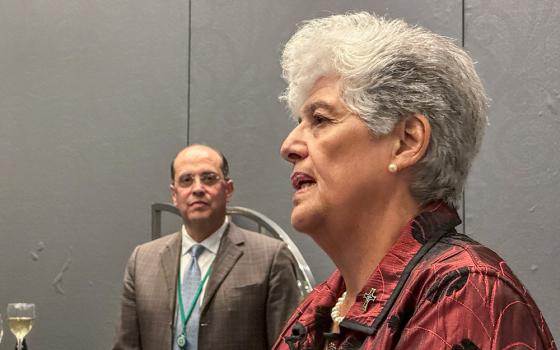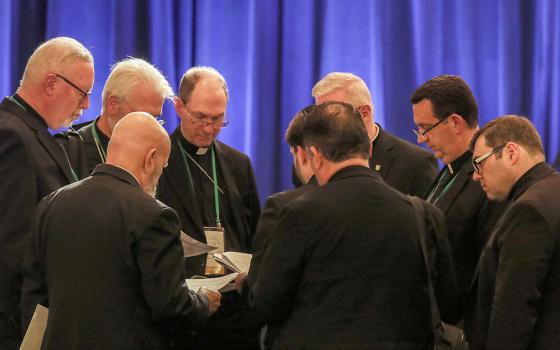
Bishops look over paperwork at the end of a Nov. 12 session of the 2024 fall general assembly of the U.S. Conference of Catholic Bishops in Baltimore. (OSV News/Bob Roller)
The shadow of Donald Trump hung over the U.S. bishops' meeting in Baltimore. Alongside their efforts to find unity among themselves, the fears of many Catholic immigrants loomed large. Regrettably, for some bishops, including the conference president Archbishop Timothy Broglio, the impending storm seemed not too worrisome.
Broglio, in his presidential address, pledged that the church will "certainly take care of those who come to this country and represent the face of Christ in their need." He then added that the bishops "certainly do not encourage illegal immigration, but we will all have to stand before the throne of grace and hear the Lord ask us if we saw him in the hungry, thirsty, naked, homeless, stranger, or sick (cf. Mt. 25:31ff) and responded to his needs."
Historically, Catholic leaders refer to migrants without proper documentation as "undocumented" not "illegal." To be fair, Broglio was referring to the phenomenon and not to a person when he used the adjective "illegal."
The Catholic Church is not in favor of lawlessness, to be sure. But might not Broglio have mentioned the desperation of those who are stuck on the other side of the border? How are we, the richest nation on Earth, to take care of them? People who have fled some of the poorest and most violent nations on Earth? Why not point out that our laws permit people to seek asylum at our borders?
Broglio could have reminded Catholics that ours is a church of immigrants in a nation of immigrants. He could have mentioned Bishop Evelio Menjivar-Ayala, auxiliary of Washington, who came to this country "illegally," crossing the border in the trunk of a smuggler's car. Now he is a bishop in the nation's capital. Menjivar could, in the most literal sense, put a human face on the story of migration in our time.
When the Obama administration refused to create religious exemptions from its mandate that all insurance policies cover contraception in 2012, Broglio wrote: "We cannot — we will not — comply with this unjust law." I agreed with that stance. But are the nation's immigration laws any less unjust than the contraception mandate? Where and when did Broglio lose his backbone?
Advertisement
The bishops — all the bishops — need to think more proactively. We can all hope that Trump will treat his pledge of mass deportation now like he treated his pledge to "build the wall" in his first term. He built a few miles of wall and took a bow. Maybe he will deport a few felons and call it a day. Maybe not.
Bishops should be thinking about how to build guardrails now, talking with lawyers about their legal options, and with sympathetic state and local law enforcement officials about methods of noncompliance with orders Trump might give that are questionable legally and/or morally. Guardrails are of no use once the car has already careened off the road.
The climate, too, might endure irreparable harm during the next four years. The bishops heard a presentation from Maronite Bishop A. Elias Zaidan, who led the Committee on International Justice and Peace. It was drier than toast and prefaced a table discussion in the room organized around the wrong questions.
For example, the first question was: "What are your best ideas of how your diocese can mark the 10th anniversary of Laudato Si'?" It should have been: "What have you done as a diocesan bishop to implement Laudato Si'?" Only the third question was spot-on: "How can these initiatives help advance the mission directive for evangelizing unaffiliated and disaffected youth?"
The whole exercise seemed designed for futility, which may have been the objective.
Bishop Daniel Flores of Brownsville, Texas, gave an excellent presentation on the fruits of the synod and here we find one of the bright spots of the week. Flores not only took the lead in the synodal process for the bishops' conference, he may be the most widely respected bishop in the conference.
After he was finished, San Diego Cardinal Robert McElroy called for the creation of a task force to help the conference implement synodality. Chicago Cardinal Blase Cupich then asked if it would be helpful to obtain a sense of the body on the proposal.
A voice vote followed and only a few bishops grumbled a low-volume no. The ayes had it. This ensures that the proposal, first floated in an interview both cardinals gave to NCR Vatican correspondent Christopher White, will not die on the vine.
Bishops do not respond to flame throwing. They respond best to proposals that seek to ameliorate divisions, not exacerbate them.
We don't know what happened when the bishops discussed the cuts at the Justice, Peace and Human Development secretariat during the executive session. When Harrisburg, Pennsylvania, Bishop Timothy Senior, chair of the subcommittee for the Catholic Campaign for Human Development, spoke to the body, you would have thought nothing was awry, except for the reduced grants.
He did not address the proposal drafted by Kansas City, Kansas, Archbishop Joseph Naumann and Springfield, Illinois, Bishop Thomas Paprocki that would redirect the funds collected by campaign to Catholic school scholarships. Presumably, the proposal died in executive session, as the effort to crush the Catholic Campaign for Human Development at the June meeting did.
Those staffing cuts, however, raised a deeper issue, one of trust between the conference leadership and the body of bishops. Was that resolved? We don't know.
The bishops' preference for consensus was evident in the votes for committee chairs and a new treasurer for the conference. A necessary step in overcoming divisions is to isolate the extremes, and the bishops did that.
The polarization of the culture has seeped into the church, but many of the bishops here in Baltimore are looking for ways to keep the cancer from spreading. The internal culture of the bishops' conference functions differently from social media algorithms. Social media rewards outrage and extremism, but within the conference, there is a profound desire to seek pacific solutions to problems.
Bishops do not respond to flame throwing. They respond best to proposals that seek to ameliorate divisions, not exacerbate them. Aware of the differences of outlook among them, consensus remains the coin of the realm.
Next year, the bishops will elect a new president of their conference. The current vice president, Baltimore Archbishop William Lori, is barred from moving up to the top spot by reason of his age. The bishops need to think about who will further their efforts to find common ground within their own ranks. The steps they took in Baltimore this week were fine, so far as they went. They still have a long way to go.






